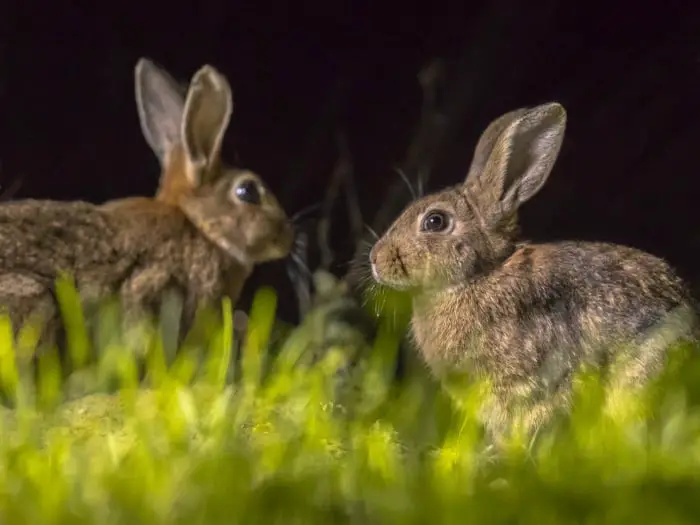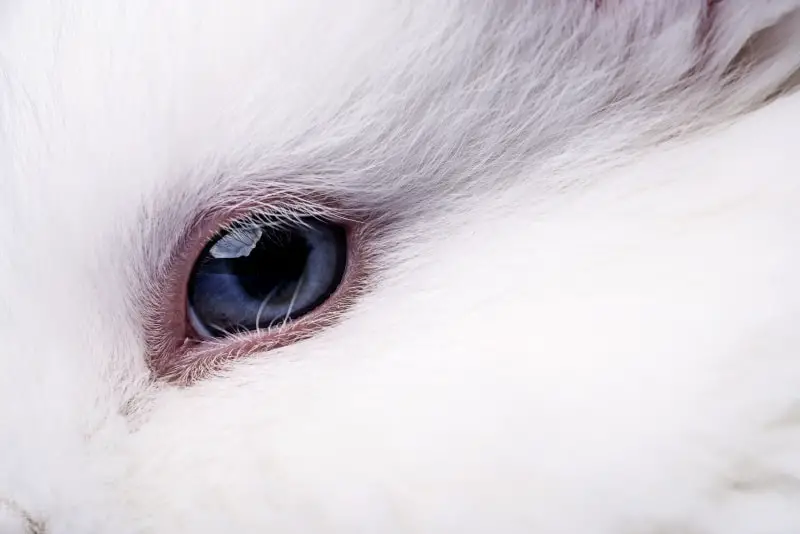As your rabbit frolics about and you look into his adorable eyes have you ever thought about how he sees the world? Have you ever wondered how do bunnies see? Here we are going to explore all aspects of rabbit vision and any issues that may be encountered.
Can rabbits see in colour?
Yes, they can. However, their colour perception is not as robust as a human’s. It is believed that rabbits can see two colours blue and green. To better understand how bunnies see, you have to learn a little about their anatomy. Their retinas contain two types of light-sensitive cells namely rods and cones. The rods in your rabbit’s eyes are triggered by low light conditions and do not aid in the perception of colour. Cones, on the other hand, are activated by bright light and allow bunnies to see colour.
Cones are sensitive to blue or green light. Your rabbit cannot see red. As such rabbits only have two-colour vision. The scientific name for this type of vision is dichromatic.
Can rabbits see in the dark?
Similar to us, rabbits are not great in the dark. A pitch-black room will totally blind rabbits. Of course, there is the science to explain why this is so. Rabbit eyes do not contain a layer of tissue that is found behind the retina and reflects light. It is called the tapetum lucidum. This tissue allows nocturnal animals to have enhanced vision at night, allowing them to hunt in the dark.
Rabbits, on the other hand, are crepuscular and move around the most at dusk and dawn. It stands to reason that their vision is the best at these times as well. Their eyes perform the best in dim lighting. Soft light is the perfect lighting conditions for rabbits. Some pet owners adjust their lightning to accommodate their buns and see a change in their behaviour! They are often more playful and frolic a lot in this lighting.
With no tapetum lucidum, your rabbit is totally blind in the dark. Unfortunately, bunnies cannot make their way out of a dark room on their own.
In fact, darkness can be very unnerving to rabbits. This is understandable since bunnies are a prey species. Without light, they cannot see if any predators are at large. If you leave your rabbit in a completely dark room, he may become anxious and exhibit signs of stress.

If you keep your rabbit indoors, he will most likely be okay. He knows that you are in the house and you probably have a little light coming in from a streetlight or you may have a light or two on at night. We recommend that you still make you home rabbit proof by removing all dangerous objects and any falling hazards if you allow your bunny to roam at night. You should also know that rabbits are pretty good at memorizing where things are in their environment, so they should be safe.
Conversely, if your rabbits are kept outdoors in a hutch, being outside in the dark could be terrifying. As you know, bunnies can suffer a heart attack if they get too agitated or afraid. As such we recommend setting up some dim lighting outdoors so that if your rabbit is awake at night, she can still see and not feel so vulnerable.
If you are also wondering how wild rabbits cope with the darkness, they usually retreat to the safety of their burrows. They do not need to see in the dark.
Do rabbits see infrared?
No, rabbits cannot see infrared, rabbits do not have any red cones. As such, they can’t see red objects or light.
Are rabbits longsighted or near-sighted?
Being the remarkable creatures that they are, they are a bit of both. We will explain. For the most part, bunnies are hyperopic or long-sighted. They can see objects that are in the distance far better than those that are close to them. Since rabbits are prey animals, it makes sense for them to be long-sighted so that can see potential predators and evade attacks.
However, your rabbit can also see things nearby like his food and toys. A bunny’s vision becomes myopic or near-sighted when it focuses on objects in front of it. So, we can safely say that a rabbits’ vision adapts to suit the subject matter that they are focused on.
Do rabbits have a blind spot?
Yes, bunnies do have a blind spot. It is right in front of their cute little noses.
Do rabbits have monocular or binocular vision?
So, let’s first clarify what each of these terms means:
- Monocular vision means that your rabbit is using each eye separately to see. Animals who have monocular vision usually have eyes that are located at the side of their head.
- Binocular vision means that your rabbit using both eyes with overlapping fields of view, allowing your bunny to perceive depth.

Bunnies vision is predominantly monocular. However, they do use their binocular vision for objects that are directly in front of them.
Do rabbits blink?
Yes, bunnies do blink. You may have already noticed this on your own. They blink less than humans do. They blink about 10 to 12 times per hour. What you may not know is that rabbits have a third eyelid. It is actually a membrane that covers the cornea. It only closes partially when your rabbit is asleep.
What is a bunny’s field of vision?
The term field of vision in this case refers to the entire area that rabbits are able to see when their eyes are focused in one spot. Rabbits have large corneas and their eyes are positioned laterally. As such rabbits have a panoramic field of vision. This allows them to spot predators and take evasive action. However, rabbits cannot see the area underneath their mouths. It’s their blind spot that we spoke about earlier. Bunnies improvise by using their whiskers and lips to scrutinize their meals.
Are there any eye problems that are specific to rabbits?
Your rabbit’s sight may be affected by certain diseases. Here are a few that you should be aware of, in case you start to notice any eye irregularities:
- Conjunctivitis – Since humans also suffer from this disease you may have already heard about it. Also known as pink eye. This is a common eye infection that is usually caused by bacteria that may be harboured in a dirty cage or contaminated water.
- Myxomatosis – This is a deadly disease that affects rabbit vision. It is caused by the Myxoma virus. The mucus membranes of the eyes become inflamed and swollen.
- Glaucoma – This is an eye condition that usually shows up in certain breeds of rabbits. For instance, it is hereditary in New Zealand White rabbits. These bunnies develop it between 3-6 months of age. Glaucoma if left untreated can lead to blindness.
- Keratitis – This condition affects the corneas of rabbits. They become inflamed and painful, resulting in blurry vision. However, it is treatable.
- Cataract – Cataracts can be caused by a number of factors in rabbits. They can be caused by infection, diet, trauma or genetics. If your rabbit has cataracts, he may see blurry and may bump into objects and appear less surefooted.
What are the signs that my rabbit is not seeing properly?
It is possible for a rabbit to be born blind or develop vision problems due to injury or infection. Here are some of the signs to look for if your bunny is having trouble with her vision:
- Bumping into stuff – If your rabbit starts bouncing into objects even in a familiar environment, you should monitor for a few days and if the behaviour persists take your bun to the veterinarian.
- Easily startled by sounds or approach – Rabbits will be jumpier if their vision is compromised. They will be more paranoid regarding predators.
- Cautious movements – Your rabbit may move slowly around his hutch or cage.
- Nervous in a new environment – Your rabbit may be reluctant to explore new surroundings.
- Holding on to objects and walls while explored – Your rabbit may start clinging to the surfaces that she comes into contact.
- Delayed response – When presented with visual stimuli like a new toy, your bunny may take a while to respond to it.
Can new-born rabbits see?
Like most mammals, kits are born with their eyes closed. Their eyes remain closed for about 7 days and then their eyes open and they are able to see.
Does age affect rabbit vision?
Yes, as your rabbit ages, her vision may deteriorate. As such older buns may move slower due to vision issues.
We trust that you now have a better understanding of how your rabbit perceives the world. You can help preserve your rabbit’s vision by ensuring that he consumes a healthy diet. Vision issues may also be caused by infection, so keep your rabbit’s cage or hutch clean with regular housekeeping. Also, ensure that your environment is safe by removing any objects that may cause injury to your rabbit. It is wonderful to know that our rabbits can see almost as well as we can.

